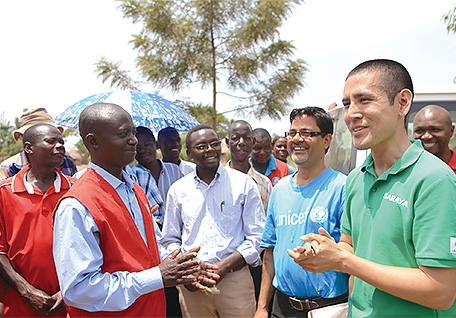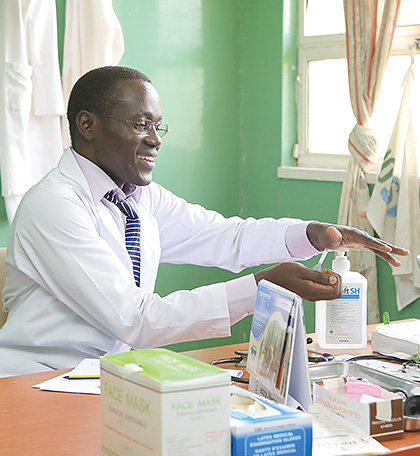Japan's Official Development Assistance White Paper 2013
Stories from the field 03
Saving Lives by Promoting Hand Washing in Hospitals
– Saraya’s Disinfection Business in Uganda –

Mr. Miyamoto with local sanitation environment improvement cooperation staff (Photo: Kentaro Taketani / Saraya Co., Ltd.)
In May 2011, medical soap and disinfectant manufacturer Saraya Co., Ltd. set up an overseas subsidiary, Saraya East Africa Co., Ltd. in Uganda on the African continent. Prior to the establishment of the subsidiary, Saraya had been cooperating with activities to improve the sanitary environment in the villages of Uganda through UNICEF. The new company was created out of the belief that Saraya could utilize its experience of sanitation improvement to contribute to solving various development issues in East Africa caused by poor sanitary environment. It was also founded based on the feeling that there was a potential of carrying out related business in the markets of East Africa. The company is now moving forward with a preparatory survey with the aim to produce and sell its alcohol hand rub locally in Uganda. This project has been approved by JICA as the “Preparatory Survey for BOP Business*1 Promotion”.
Uganda has a high infant mortality rate (IMR) of 99 in 1,000, and a poor maternal mortality ratio (MMR) of 310 in 100,000. The biggest risk factors associated with the IMR, besides malaria, are acute diarrheal disease and acute respiratory illnesses. The major cause of the high MMR is an infectious disease as well – post-caesarian sepsis. Insufficient progress in infrastructure development has left many hospitals in Uganda without access to clean water, making infectious diseases a life-threatening issue for children and pregnant women.
Saraya started its support for Uganda in 2010 as a part of its CSR*2 activity. The company already knew that the blackstrap molasses made in Uganda as a byproduct of the production of sugar and liquor from cane sugar could be used to manufacture bioethanol needed to make alcohol hand rub. Since alcohol hand rubs require no water, they seemed to present an effective means of improving hand hygiene even in a country like Uganda, where there is poor access to clean water. The company began to consider establishing new business in the country, and a cooperative preparatory survey was conducted through a JICA scheme.
Mr. Kazumasa Miyamoto, the President of Saraya East Africa, has experience of living in Uganda as a JOCV. He was attracted by the country, and returned there after his assignment was over, and established an NPO in 2009 to support the local agriculture. “In the process of extending microfinance loans to agricultural projects, I came to believe that we must not neglect the idea of profit as we work on development issues – we can in fact make a more sustainable and effective contribution to solving the issues by working in line with market principles and running projects as a business wherever possible. Right around the time that I started to think that way, I met representatives from Saraya, who were at that time considering setting up a branch office here.”
Mr. Miyamoto began his work with a pilot project in two public hospitals. With the cooperation from two JOCV nurses at each location, he first implemented training for hospital staff on the importance of hand hygiene based on the hospital sanitation program of WHO. From there, they introduced the alcohol hand rub into the hospitals, conducted continuous surveys on the use of hand sanitation, and gave feedback diligently to hospital staff how hand hygiene had produced the positive effects depending on the amount of rub used. (see the photo on this page)
At Gombe Hospital, one of the hospitals where he conducted the project, prior to the project there had been an average of around five cases of post-caesarian sepsis and around seven cases of infant acute diarrheal disease every month. Yet in November 2012, half a year after the introduction of the alcohol hand rub, the attack rate for both infectious diseases had reached zero. Mr. Miyamoto commented, “The hospital director was overjoyed, ‘This is the first time this has ever happened since the opening of this hospital!’ He is now working as a missionary for us, spreading the awareness of the prevention of hospital-associated infections (HAI) in and outside of the country. I guess it would have much greater impact when they learn the success story of the hospital in the same environment as theirs, rather than we, coming from outside of the country, explain persistently to them.”
The project is now working on promoting the alcohol hand rubs to even more hospitals and conducting a survey to know if the cycle from local production to distribution can be established. Mr. Miyamoto explained the key points to work towards BOP business in Africa.
“BOP business does not differ in the basic principles from other business. If the local people need the product, it will sell well, and if they don’t need it, it won’t sell. We provide consumers with fair-priced products and services that we have put out into the world with confidence. While we are contributing to the development of the countries of Africa, which are sure to grow in the future, but at the same time, I feel that we too are receiving the favors of the African market, which is now so full of possibilities. By doing so, I believe that the local people and the companies can construct mutually beneficial relationships, which I think would lead to social contribution.”
*2. Corporate Social Responsibility.

A doctor at Gombe Hospital explains that he can no longer see patients without using hand sanitizer. At an outpatient examination room. (Photo: Kentaro Taketani / Saraya Co., Ltd.)
